
Explaination
Consequences
The widespread adoption of the Self Sustainment System has the potential to trigger the greatest revolution known to mankind.
The various benefits of its worldwide adoption include but are not limited to the following ones:
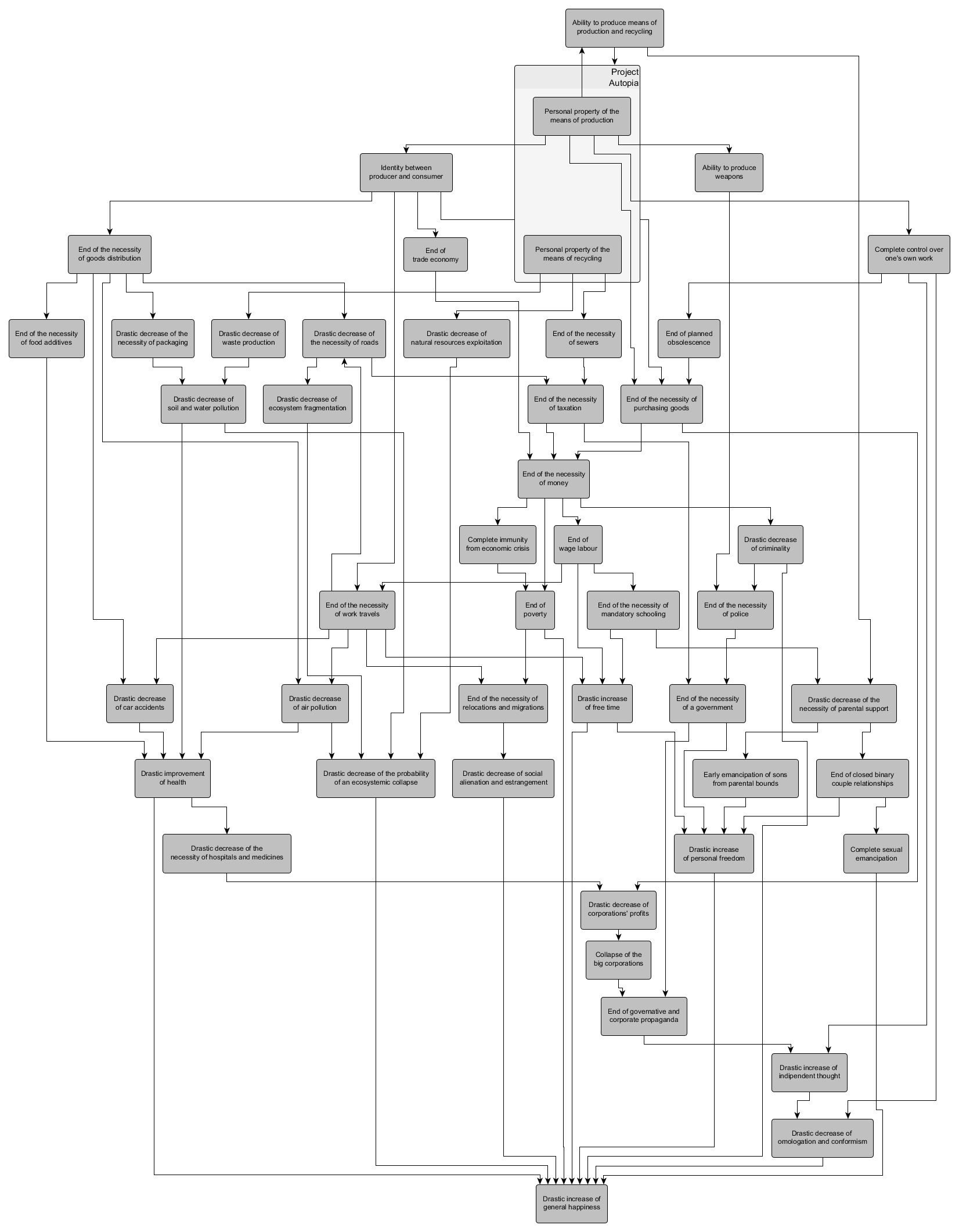
The effects of the Self Sustainment System on society
Emancipation from dependence
In the present system, society is divided in 2 categories: the owners of the means of production, who are called "producers" (even though they're not the ones who actually produce goods) and the owners of the produced goods, who are called "consumers"; the producer provide goods to the consumer in exchange for money (price), while the second get the needed money by working for the first.
Even though this might seem a perfectly symmetrical deal, it is not: since the consumer lacks the means to support himself while the producer doesn't, the first necessarily needs the second, but not the other way around; this allows the producer to unbalance the exchanges towards his side (either by increasing work or prices or by decreasing salary or goods) with almost no risk of opposition from the other party;
this fact reduces the producer-consumer relationship into one of serfdom, in which the consumer/slave is literally owned by his producer/master and forced to work not only for himself but also (and especially) for him under threat of being cut off from his life support.
Project Autopia, by extending the ownership of the means of production to every single consumer, turns each one of them into a producer himself, removing his need for an external one; this will enable everyone to only work *for* their own needs and *by* their own will and thus greatly increasing everyone's amount of free-time and degree of control over their own life.
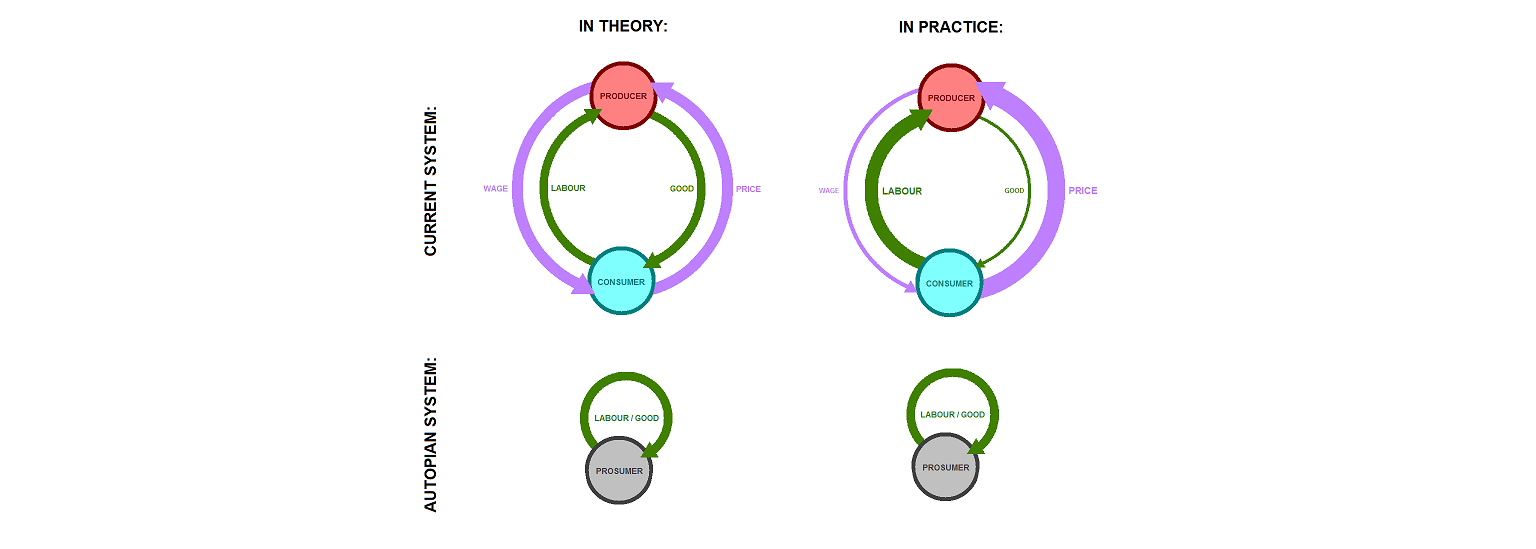
Individualization of choice
In a system where everyone depends on someone else (like the current one), the needs of every person are deeply interwined with the needs of other people: the choices and decisions of one necessarily impact on everyone else, meaning that a lot of problems can not physically be resolved individually, but only through a single common solution everyone must settle for, and that therefore can never fully satisfy everyone's wills.
On the other hand, in a system where individuals are entirely autonomous and independent from each other (like the autopian one), the consequences of individual choices always remain confined to the individual itself, removing the need for common solutions to the vast majority of problems and allowing anyone to choose the solution that's better for himself, granting the maximum possible satisfaction of everyone's wills.
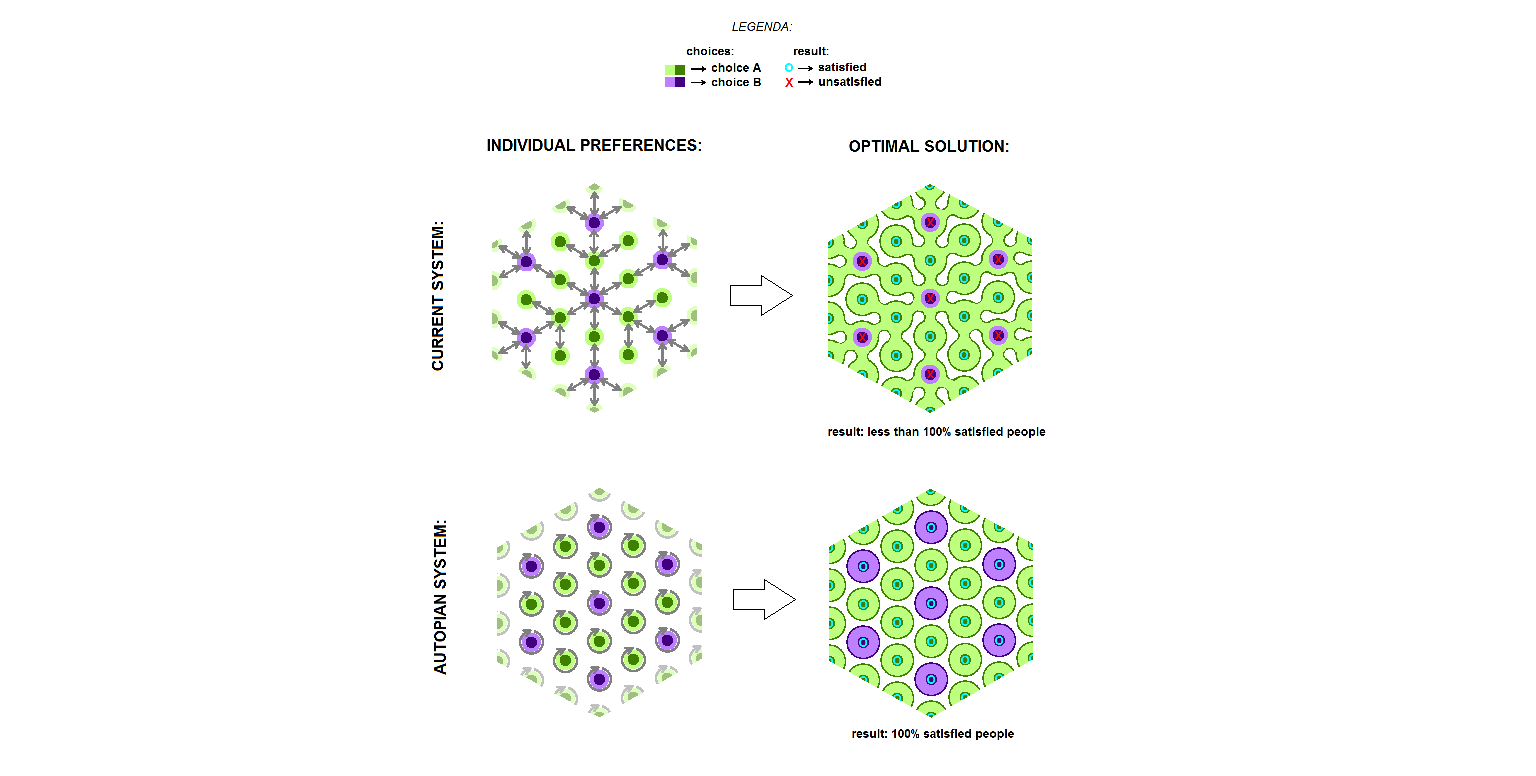
Direct control
When a person has to rely on someone that in turn also has to rely on another, the life of the first depends not only on the second, but also on the third; therefore, someone's degree of dependence is multiplied for each link of the chain that leads to him. Moreover, each one of these links places the elements that determine his life farther away from his reach, making increasingly difficult for him to understand them and to effectively intervene on them. In a highly centralized system like the present one, the number of dependence factors and the degrees of separation placed between them and the individual is so high that his effective control over them is reduced to nearly zero.
Conversely, in a world free from dependence like the one promoted by Project Autopia, those degrees of separation are reduced to zero, placing all the factors that determine an individual's life entirely into his direct control.

Improved systemic resilience
In a centralized economic system like the current one, the vast majority of nodes (people) depend on a small minority of production/distribution nodes, which in turn can also depend on others; this means that every kind of damage (whether accidental or intentional) one of those nodes is subject to will inevitably affect every node that relies on it, and so on in a chain reaction that will propagate the damage to huge portions of society, affecting a huge number of people and leaving them completely devoid of any kind of protection or alternative node to rely on; this is what's known as "economic crisis".
By contrast, in a decentralized economic system like the autopian one, every damage will always remain confined to its direct subject while at the same time leaving it with a high number of alternative nodes to rely on, and eventually restore the damage, making the very concept of "economic crisis" nearly meaningless.
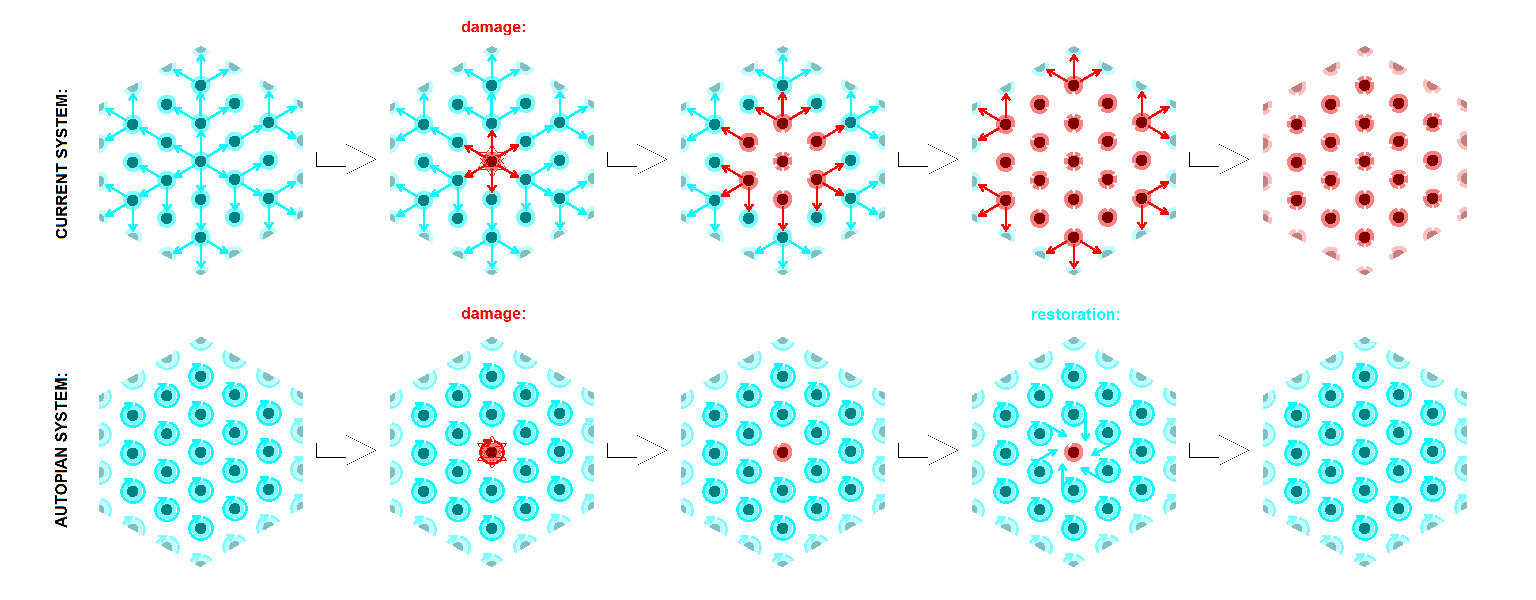
Power surfacting
Dependence generates power, specifically the power of a person over the ones who depend on him; by its very definition, power is self-concentrating: having power means having the ability to obtain even more power: the more power someone has, the easier it will be for him to gain even more from those who have less, conversely the less power someone has, the harder it will be for him to do the opposite; this positive feedback mechanism mathematically guarantees that power will always spontaneosly tend to flow from where there's less of it to where there's more, inevitably leading to a situation where all the power in the world is concentrated in the hands of a handful of individuals, ruling over the entire world with dictatorial powers. In other words, power inside society behaves like oil inside water, always spontaneouly tending to aggregate itself in a single place instead of distribute.
The only way to avoid this to happen is by introducing an element that spontaneously prevents power from being transferred from an individual to another. That element is the Self-Sustainment-System. In other words, the Self-Sustainment-System acts like a "surfactant agent" that keeps power evenly distributed through society preventing it from concentrating in a single place.
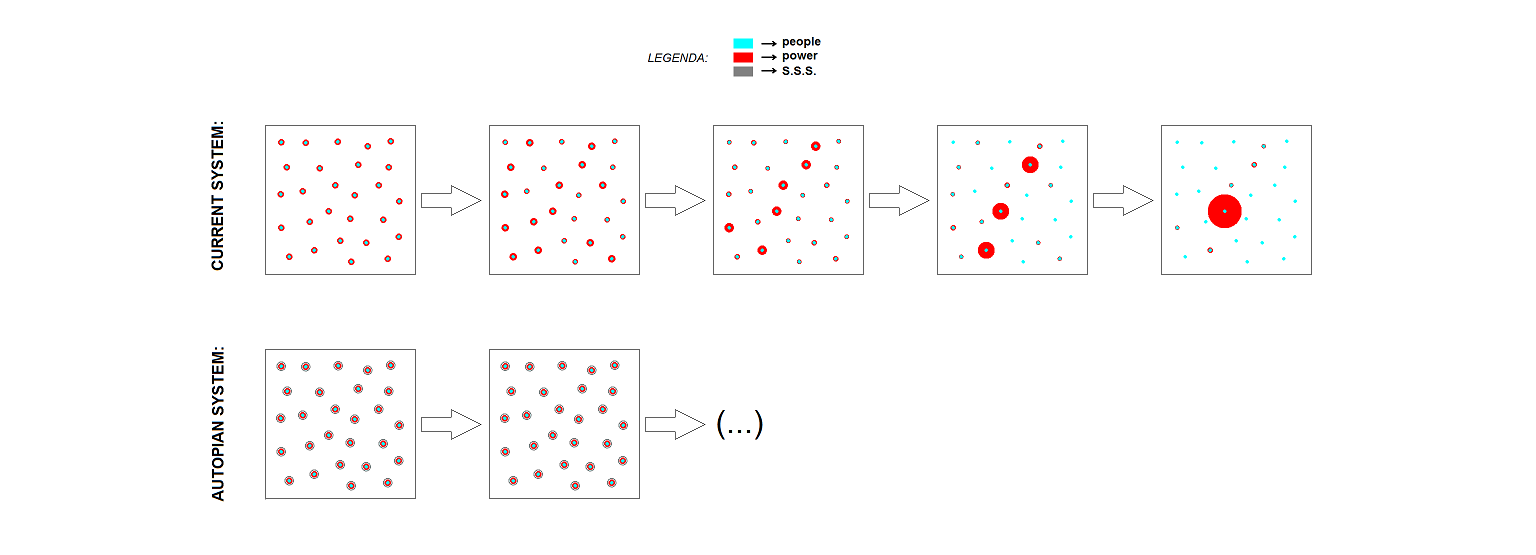
Ultimate problem resolution
The vast majority of the problems that afflict human life, from devices' malfunctions to bodily ailments, require very specific means and knowledge in order to be solved. In a system where those means are limited to a handful of individuals, people can only solve their problems by relying on them, and rewarding them for their service; this means that "problem-solvers" actually benefit from people's problems and thus are motivated to make sure problems will never stop resurfacing, and to achieve that result either by implementing solutions that are merely temporary instead of definitive, or sometimes even by generating entirely new and not pre-existing problems. This guarantees that sickness, diseases, planned obsolescence and countless other natural and/or artificial problems plaguing mankind will never stop existing as long as society continues to work with the current system.
In contrast, in a system where people achieved the ability to solve their problems on their own means like the Autopian one, no one will have anything to gain from their continued perpetuation, thus finally paving the way for their definitive solution.

Inverse social darwinism
Darwinian selection is the mechanism through which, in a given population, the variants who are more fit to survive in their environment gradually replace the less fit, because of the highest death rate of the latter, and their resulting inability to reproduce.
In any system based on dependence, the ones who are either unable or unwilling to submit themselves to the ruling class are cutoff from any means of sustainment, so that they're barely able of surviving, much less influencing society at large; therefore, the ones who are more prone to either submission or exploitation are the most fit to survive and fix these traits into the population, while the drive for empowering and emancipation are doomed to disappear as disadvantageous ones. This means that, in the present economic environment, there is a constant selective pressure towards more and more submissive and/or exploitative traits, leading to the progressive degradation of people's rights and living conditions.
Contrary to this, with the Self Sustainment System, individuals will be able to shape their own environment adapting it to their own needs instead of being forced to adapt themselves to it; with the resulting proliferation of different personal micro-environments, the unfit ones will disappear not through elimination by selection, but through spontaneous self-improvement by learning from the examples of others.
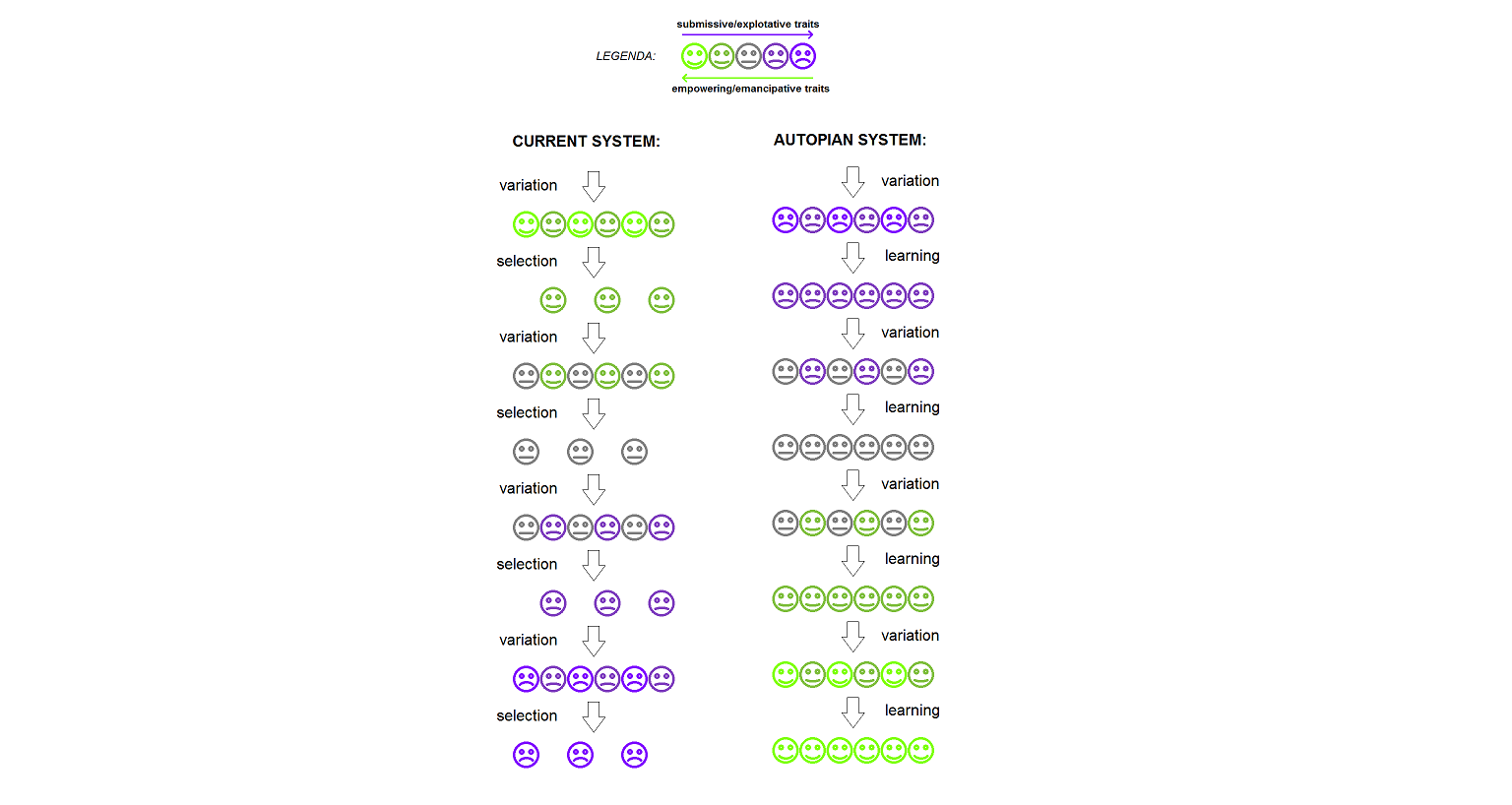
Maximization of human potential
Scientific and technological innovation requires both new ideas and the physical means to put them into practice; in a system like the current one, where those means are in the hands of a selected elite, the only way innovators have to see their ideas come to light is to submit themselves to the appointed institutions, which entails not only a huge waste of time to obtain the required qualifications, but also that only the kind of innovations that said institutions deem to be profitable for them will have any chance to actually get supported, while the others will either be discarded or even actively suppressed, regardless of their actual benefit for mankind as a whole; meanwhile, the ideas of people who choose remain independent instead of submitting themselves to others, are fated to only remain on paper, and to unavoidably die with them.
The autopian system, on the other hand, extends to everyone the means actualize one's own potential, meaning that anyone with a new idea will be able to immediately put it into practice by his own means; this will lead to an exponential acceleration of scientific and technological advancement in ways that are actually beneficial to mankind.

Minimization of familial dependence
Since their birth, individuals are entirely dependent on their parents for all their needs, placing the first in a condition of complete subjection and the second under a heavy moral burden, dramatically restricting the freedom of both parties; moreover, a system where people are also dependent on various organizations (states, companies, etc...) like the current one, puts on the growing individual a huge deal of additional obligations (school, stages, etc...) required to prove himself worthy of being subject to those organizations, artificially extending this situation to the point that an average human being spends about half their life as a subject of their parents and the other half as a subject of their sons, their partners and the rest of society.
On the other hand, when all the means of production are already in possession of the single individual since the time of his birth, he is only bound to their parents until acquiring the ability to provide for himself; after that time has passed, he is already able to live his own life as a free indipendent individual, exempting his parents from any obligation and therefore from their fixed couple relationship, which will restore complete freedom to both parties while at the same time paving the way for a true sexual emancipation as well.
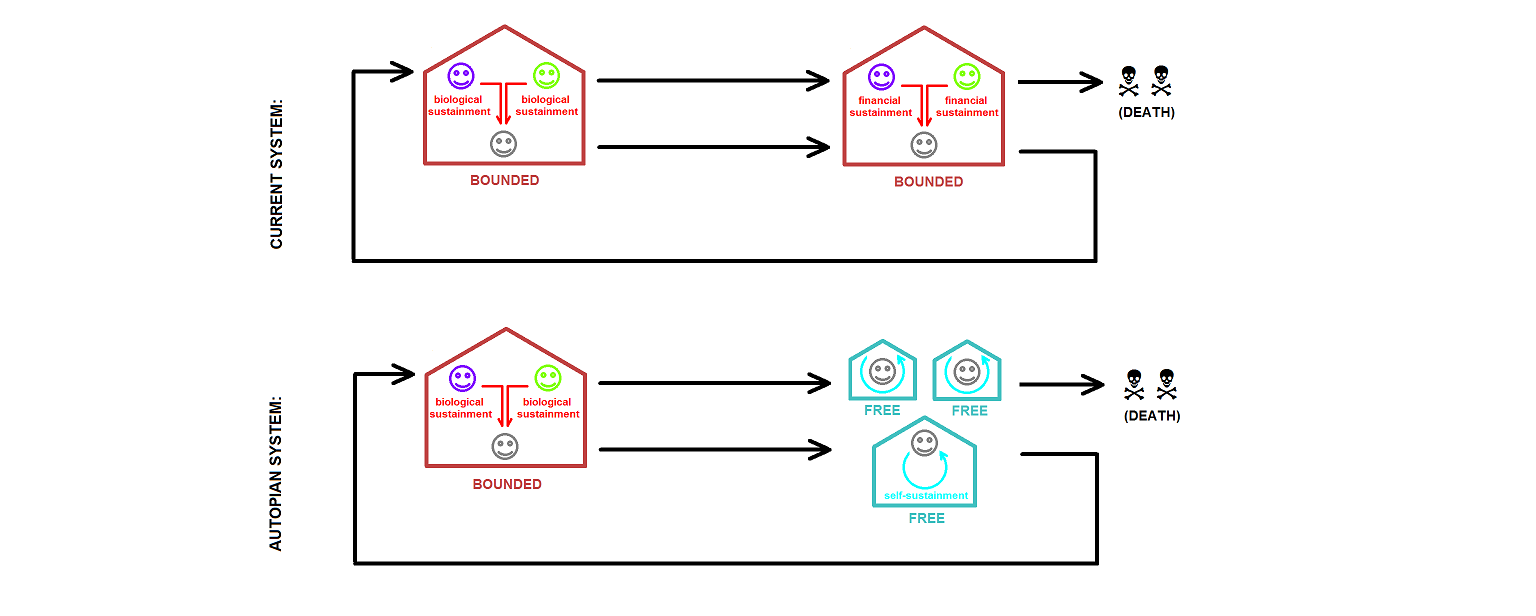
Ecosystems uncoupling
The current economic system relies on huge amounts of resources being extracted from the environment and, once used, returned to it in a form not readily convertible to its original state and thus not only unable to restore the damage, but even harmful for it; if this continues it will unavoidably lead to a global collapse of the whole ecosystem which, in turn, will also affect the very civilization that relies on it, leading to the collapse of civilization itself.
The self-sustaining cycle of production-consumption-recycling of the S.S.S. will turn every household into a small-scale closed ecosystem with nearly no excanges with the outside environment; this will lead not only to a greatly reduced impact of man's activities on the natural environment that will make a global ecosystemic collapse way less likely to happen, but also to a greatly reduced need to rely on the natural ecosystem meaning way higher chances for mankind to survive even in the unlikely case that said collapse would actually happen.
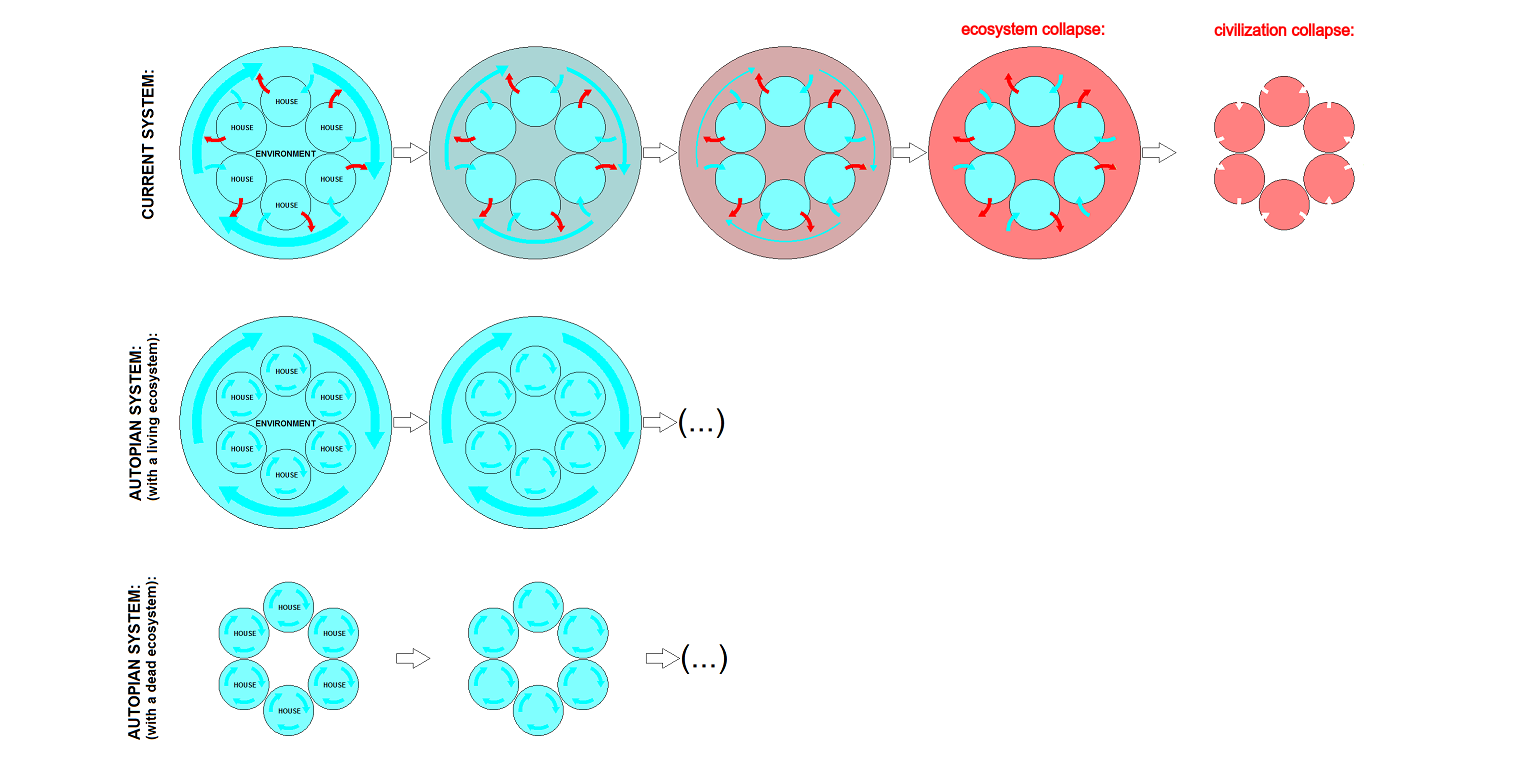
Competition of systems
The present system has now become the only existing way of life for the vast majority of people; this means that the people who are in the dominant positions of society (i.e.: the owners of the means of production) have no stimulus to keep the standards of life of their subjects as high as they were until now, and are free to withdraw whatever amount of rights and welfare they want, since people have no alternative system to "escape" to.
When the autopian system will start to become widespread, it will represent a strong competitor to the old one, which will be forced to make more and more concessions to its subjects and to give back their rights, welfare and living standards in order to convince them to remain faithful to the old system and prevent them from adopting the new one. In this way, paradoxically, the autopian system has the potential to improve even the life of people who choose to stick to the old one.

Feedback
The self-sustaining nature of the Self Sustainment System guarantees that a initial effort will trigger a positive feedback leading to the exponential acceleration of its own adoption and consolidation.
Local Implementation
In the current system, every person gets everything he needs from external sources, and waste products are returned to outside, meaning there's a continuous flow of matter to (input) and from (output) everyone's house.
What Project Autopia aims to do is to divert that open linear flow into a closed cyclic one, through the implementation of self-production and self-recycling devices: any self-recycling device added to the flow will reduce the amount of generated output, while any self-production device will reduce the amount of required input.
Furthermore, self-production devices able to replicate the components of other devices will reduce the amount of required input for the production of the devices themselves, triggering a positive feedback that will lead to the exponential improvement of the system, while at the same time enabling each individual to guide the revolution by his own means, without the need for external help and guidance.
It should be noted that achieving a mathematically 100% closed cycle is impossible since it's not possible to completely avoid the dispersion of materials. However, as more components are added to the system and/or the ones already present are improved, is possible to gradually shrink those leaks, and with them the need for external input required to restore the loss, to such an amount that just occasional retrieval/collecting intervention will be enough to manage it. In other words, at the practical level, what Project Autopia aims to do is to gradually decrease the amount of any household's inputs and outputs in order to asymptotically approach a level of complete self-sufficiency.

gradual transition from an open flow to a closed one
Global Spreading
In the current system, every person gets everything he needs from external sources; this means that, in the first phase of the revolution, people will still have to depend on producers to get the required components for the S.S.S., which could involve a very heavy investment. However, since the S.S.S. implies the ability to produce its own components, each person who will succeed in obtaining it will have become a producer himself, and therefore, a potential new source of new S.S.S.s for other people; this in turn will enable each one of them to become themselves new donors for still more people and so on in a chain reaction that will ensure that the S.S.S. will propagate through society entirely on its own at an-ever increasing pace, without the need for any external control or guidance.
Note that, even though there's no guarantee every S.S.S. will necessarily choose to become a donor, as long as at least 1 of them exists, the S.S.S. will still propagate (albeit at a very slow rate), and with it the probability of new donors; this ensures that the aformentioned chain reaction will still automatically trigger as soon as the number of already existing owners reaches a certain threshold which depends on the percentage of people eager to become new donors.

gradual expansion of the new economy through the society
Return